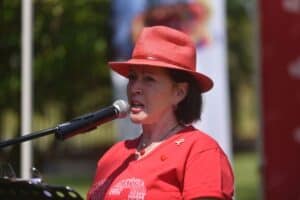He was many things to so many people, but a sellout was never one of them.

On January 31, 1985 the president of apartheid South Africa offered to release Nelson Mandela from prison on condition he renounced violence and the then banned African National Congress did the same.
What’s almost never reported is the fact that 18 other political prisoners, including Dennis Goldberg, took PW Botha’s offer of conditional release. Among the 18 were four PAC long-term prisoners who also accepted the offer.
Mandela? He famously sent his reply through his daughter, Zindzi Mandela, who read it out loud to a packed Orlando Stadium rally.
“I cannot sell my birthright nor am I prepared to sell the birthright of the people to be free. I cannot and will not give any undertaking at a time when I and you, the people, are not free,” he said. “Your freedom and mine cannot be separated.”
Mandela was just 66 then and Zindzi 24. He could have chosen a life free of complications of liberating a racially divided country and settled into his old age free of any guilt.
Twenty-two years in jail away from his young family could not have been a walk in the park. Yet, today, we have upstarts who want to paint Mandela as a sellout, wanting to brand him as one who sat down with his oppressors and sold the soul of this country for his own benefit.
When a country is going through as much economic hardship as ours, there will always be a temptation to look back and find some unfortunate soul to blame for the ills that bedevil it.
And Mandela, having endeared himself to the white section of this country, has become an easy target for young revolutionaries to take pot shots at.
Revolutionaries who are failing to remove a corrupt president from power have the audacity to brand Mandela a sellout when the rest of the world can only wish for principled leaders like him.
Because of the poisoned atmosphere that is our political landscape, it has become difficult to encourage fellow citizens to go back to the basics Nelson Mandela preached; the basics that maintained there is room for all of South Africa’s races in a free and democratic dispensation. But Mandela never preached pie-in-the-sky rainbow nationalism.
“Massive poverty and obscene inequality are such terrible scourges of our time – times in which the world boasts breathtaking advances in science and technology, industry and wealth accumulation – that they have to rank alongside slavery and apartheid as social ills,” he said.
He never once was an apologist for engineered social inequalities. Mandela dreamed of a “world where all races worked together in harmony”.
Races working together requires an extraordinary amount of work from the previously advantaged and an equally extraordinary amount of patience from the previously disadvantaged.
That successive governments of the ruling party have not done enough to keep the Project South Africa train on track since Mandela laid the blueprint does not mean it is not doable.
In fact, as we remember Mandela, it is time to ask ourselves that almost redundant question to which we all know the answer: “What would Mandela have done?”
It’s redundant because we know he would have exhorted us to take to the streets and fight. It would have been foreign for him to even be associated with a fake news story alleging he’s been asked to resign for R2 billion.
Mandela must remain our beacon.

Sydney Majoko.
Support Local Journalism
Add The Citizen as a Preferred Source on Google and follow us on Google News to see more of our trusted reporting in Google News and Top Stories.






